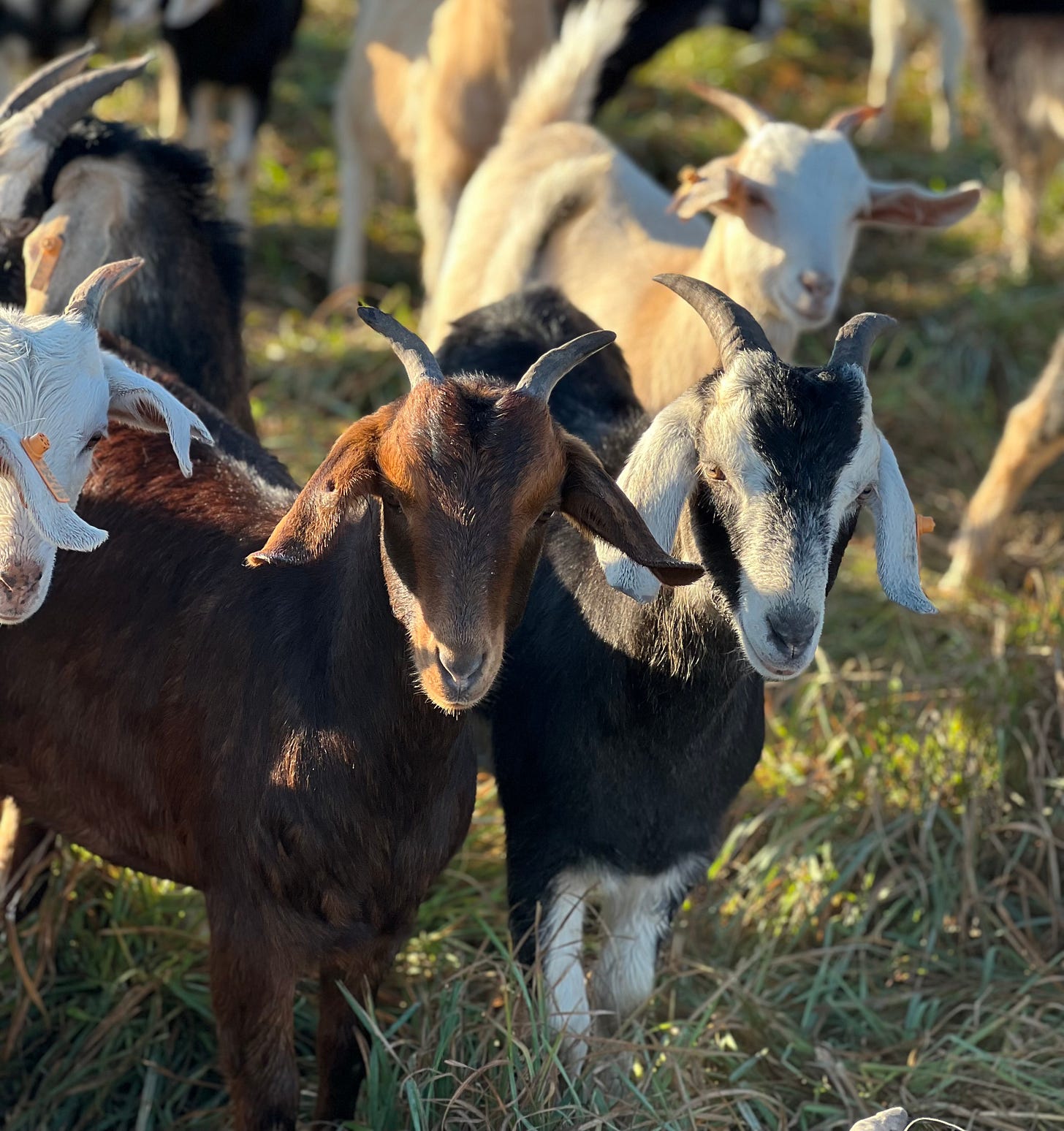Beth Hoffman is co-owner of Whippoorwill Creek Farm in south central Iowa. They pasture-raise cattle and goats, host farm dinners and classes, and have an Airbnb for overnight stays.
We brought the goat back to the house on Monday, the one we called Mabel, or Myrtle, or Myra, depending on who you asked.
She had been getting thinner over the past few days, and her legs were a bit wobbly. So we packed her up in the back of the pickup, and John sat with her, ostensibly to hold her down. He hadn’t needed to; she was completely complacent. She simply sat there in the bed of the truck, staring out blankly at the road with her freaky horizontal goat pupils, the world passing before her eyes.

Once home, we placed her in a makeshift pen outside of the chicken house and she immediately went to the food and began to eat. The hay we had put out seemed to be exactly what she wanted, and she feasted on the alfalfa and grass. We even brought her parsley and lettuce, some of her favorites.
We were hopeful.
But she was still weak.
Within about a day, her legs gave out. We would pick her up and move her legs for her, pretending she was running on air. But it was in vain, we knew, and the goat was in her last days.
Myrtle had never been a popular goat with the herd. She didn’t have horns, only nub horns, and was singled out and picked on. Perhaps for being a different breed (she was a Nubian and the rest are Kikos) or maybe she gave off some kind of challenged vibe the others took advantage of, like a bunch of middle school girls.
It ended her up in a pickle more than once.
Then, one 4th of July a few years back, the entire herd took off. The next morning, we found all of them—except Myrtle. After looking around for a bit, I found her about a 1/4 mile off our property in a hole. I called for backup; it took three grown men pushing and pulling on her wide belly to hoist her out.
Another time, she broke a horn nub—a very painful experience for a goat—likely from being hit in the head by the other goats. And when you watched closely, she was constantly pushed away from food, made to eat last, and bullied by the other goats.
But her more difficult life had perhaps made her resilient, independent. She was nobody's pet, not a cuddly creature, and she was picky about her treats. She was a loner, an old dairy goat who had lost her usefulness and ended up on our farm. She endured.
And year after year, despite the fact she only had one functioning teat (the other dried up from a bad case of mastitis), she would raise two or three healthy, vibrant goat kids. That one milker produced some of the most beautiful goats we have on the farm.
If I were being honest, I would admit that I didn’t much care for the goat, or even know her very well. She wasn’t cuddily, pet-like, or even particularly cute. She was kind of sweet, in a sort of standoff-ish goat way—she didn’t like to be touched by humans and never came over to greet you, unless she could see you had a treat.
And on a farm, well, farming is literally the business of life and death. It is a farmer’s job is to help life begin, to nurture the beings properly while taking care of the earth, and then to gracefully see to its end.
But witnessing Myrtle’s last days touched me. She was one damn strong goat, holding on till the bitter end, even when she couldn’t stand or move around.
Yesterday, on her last day, she just laid there, her breath labored and her eyes blinking, refusing to submit and pass quickly. She was on the slow train and not to be rushed. There seemed to be a pride in it for her, an incomprehensible wanting to hold on and to not let go.
Why, I wondered? What is it in many of us—human, goat, plant, or fish—that clings to this world, even when we have no cognitive ability to be sentimental about it?
It makes me think, or perhaps, remember, that life is sacred. An awe-inspiring, jaw-dropping, heart-wrenching, inspiration. Something to be treasured and appreciated at every twist and turn. And although Mabel was incapable of understanding the preciousness of that spark within her, she instinctively kept the candle burning.
We found Mabel this morning, that spark now gone from her body. Perhaps she’s retired to some kind of goat heaven, or perhaps her energy is dispersed among the millions of stars in the sky.
But I am grateful she reminded me again of the dignity and caring—the love— we must show to everything on this planet, be it a drop of water, a newborn baby, or even a washed-up old dairy goat.
Let’s celebrate Black History Month with the Iowa Writers Collaborative!
And an episode about African-American farmer Todd Western III from the Iowa Civil Rights History Podcast.







A moving, thoughtful tribute, Beth. Thanks for this reminder.
Oh, my goodness. This is the sweetest story. I began to cry the moment Myrtle had her first struggle. It is often so difficult to appreciate what we have - no matter how big or small - rather than what we believe might be missing or falling short. Thank for sharing this story. And thank you, Myrtle, for the inspiration.